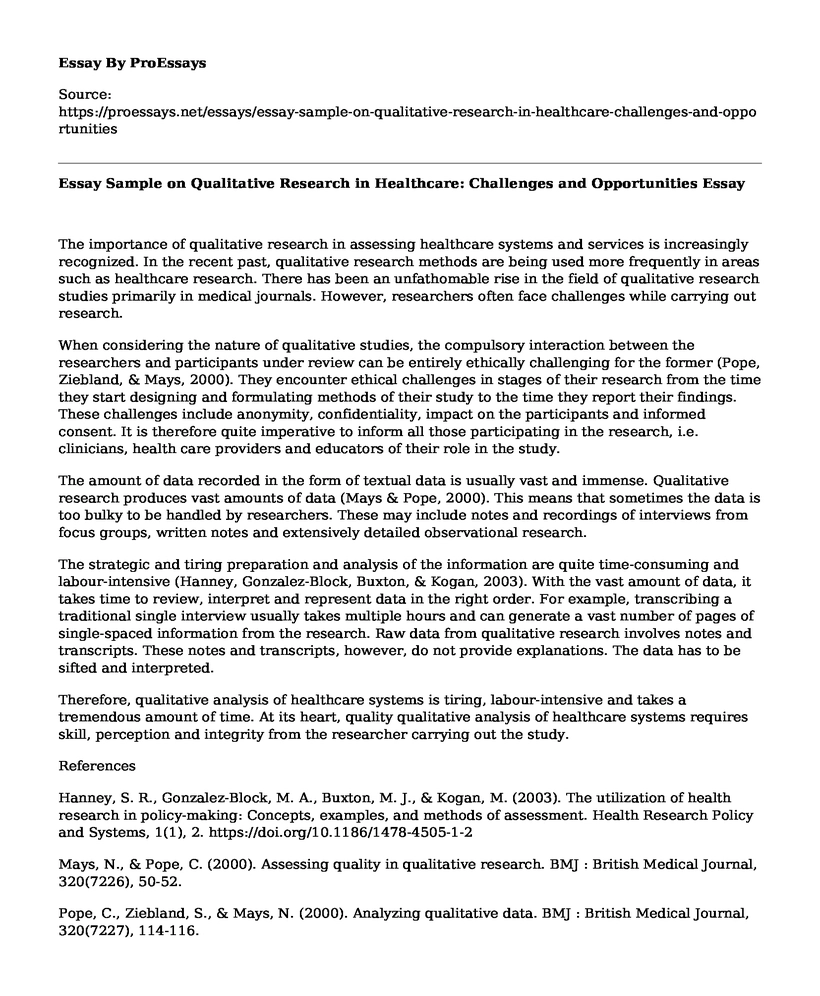The importance of qualitative research in assessing healthcare systems and services is increasingly recognized. In the recent past, qualitative research methods are being used more frequently in areas such as healthcare research. There has been an unfathomable rise in the field of qualitative research studies primarily in medical journals. However, researchers often face challenges while carrying out research.
When considering the nature of qualitative studies, the compulsory interaction between the researchers and participants under review can be entirely ethically challenging for the former (Pope, Ziebland, & Mays, 2000). They encounter ethical challenges in stages of their research from the time they start designing and formulating methods of their study to the time they report their findings. These challenges include anonymity, confidentiality, impact on the participants and informed consent. It is therefore quite imperative to inform all those participating in the research, i.e. clinicians, health care providers and educators of their role in the study.
The amount of data recorded in the form of textual data is usually vast and immense. Qualitative research produces vast amounts of data (Mays & Pope, 2000). This means that sometimes the data is too bulky to be handled by researchers. These may include notes and recordings of interviews from focus groups, written notes and extensively detailed observational research.
The strategic and tiring preparation and analysis of the information are quite time-consuming and labour-intensive (Hanney, Gonzalez-Block, Buxton, & Kogan, 2003). With the vast amount of data, it takes time to review, interpret and represent data in the right order. For example, transcribing a traditional single interview usually takes multiple hours and can generate a vast number of pages of single-spaced information from the research. Raw data from qualitative research involves notes and transcripts. These notes and transcripts, however, do not provide explanations. The data has to be sifted and interpreted.
Therefore, qualitative analysis of healthcare systems is tiring, labour-intensive and takes a tremendous amount of time. At its heart, quality qualitative analysis of healthcare systems requires skill, perception and integrity from the researcher carrying out the study.
References
Hanney, S. R., Gonzalez-Block, M. A., Buxton, M. J., & Kogan, M. (2003). The utilization of health research in policy-making: Concepts, examples, and methods of assessment. Health Research Policy and Systems, 1(1), 2. https://doi.org/10.1186/1478-4505-1-2
Mays, N., & Pope, C. (2000). Assessing quality in qualitative research. BMJ : British Medical Journal, 320(7226), 50-52.
Pope, C., Ziebland, S., & Mays, N. (2000). Analyzing qualitative data. BMJ : British Medical Journal, 320(7227), 114-116.
Cite this page
Essay Sample on Qualitative Research in Healthcare: Challenges and Opportunities. (2023, Mar 29). Retrieved from https://proessays.net/essays/essay-sample-on-qualitative-research-in-healthcare-challenges-and-opportunities
If you are the original author of this essay and no longer wish to have it published on the ProEssays website, please click below to request its removal:
- Importance of EBP Essay Example
- Essay Example on Assisted Suicide, Euthanasia: Controversy, Morality, Suffering
- Research Paper on Arthritis: OA & RA - Causes, Symptoms, & Treatment
- Essay Sample on Gastric Surgery: A Conventional Approach for Weight-Loss
- Healthcare Ethics: Safeguarding Patients' Welfare - Essay Sample
- Research Paper on Systems of Care: Mezzo Initiatives for Social Workers & Families.
- Diabetes: Causes, Complications & Foot Wounds - Essay Sample







